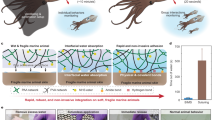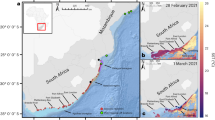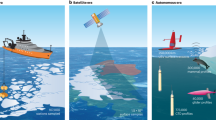Abstract
IT is generally recognized that the cuttlebone not only serves the cuttlefish, Sepia officinalis (L.), as a skeleton but also gives it buoyancy. The cuttlebone contains gas spaces which give it a density of about 0.6. It is also known that cuttlefish kept in aquaria sometimes tend to float at the surface and appear to be lighter than sea water. Our experiments show that cuttlefish do change in density, and the difference between a ‘light’ and a ‘heavy’ cuttlefish is almost entirely due to a difference between the densities of their cuttlebones, the density and volume of the rest of the animal remaining almost constant.
This is a preview of subscription content, access via your institution
Access options
Subscribe to this journal
Receive 51 print issues and online access
$199.00 per year
only $3.90 per issue
Buy this article
- Purchase on Springer Link
- Instant access to full article PDF
Prices may be subject to local taxes which are calculated during checkout
Similar content being viewed by others
References
Appellöf, A., K. Svenska Vetensk. Akad. Handl., 25, No. 7, 1 (1893).
Robertson, J. D., J. Exp. Biol., 26, 182 (1949).
Robertson, J. D., J. Exp. Biol., 30, 277 (1953).
Author information
Authors and Affiliations
Rights and permissions
About this article
Cite this article
DENTON, E., GILPIN-BROWN, J. Buoyancy of the Cuttlefish. Nature 184, 1330–1331 (1959). https://doi.org/10.1038/1841330a0
Issue Date:
DOI: https://doi.org/10.1038/1841330a0
This article is cited by
-
Morphological disparity in extant and extinct sepiid phragmocones: morphological adaptions for phragmocone strength compared to those related to cameral liquid emptying hypotheses
Swiss Journal of Palaeontology (2022)
-
Ocean acidification and temperature rise: effects on calcification during early development of the cuttlefish Sepia officinalis
Marine Biology (2013)
-
Functional Significance and Weight Properties of the Shell in Some Mollusks
Biology Bulletin (2005)
Comments
By submitting a comment you agree to abide by our Terms and Community Guidelines. If you find something abusive or that does not comply with our terms or guidelines please flag it as inappropriate.



